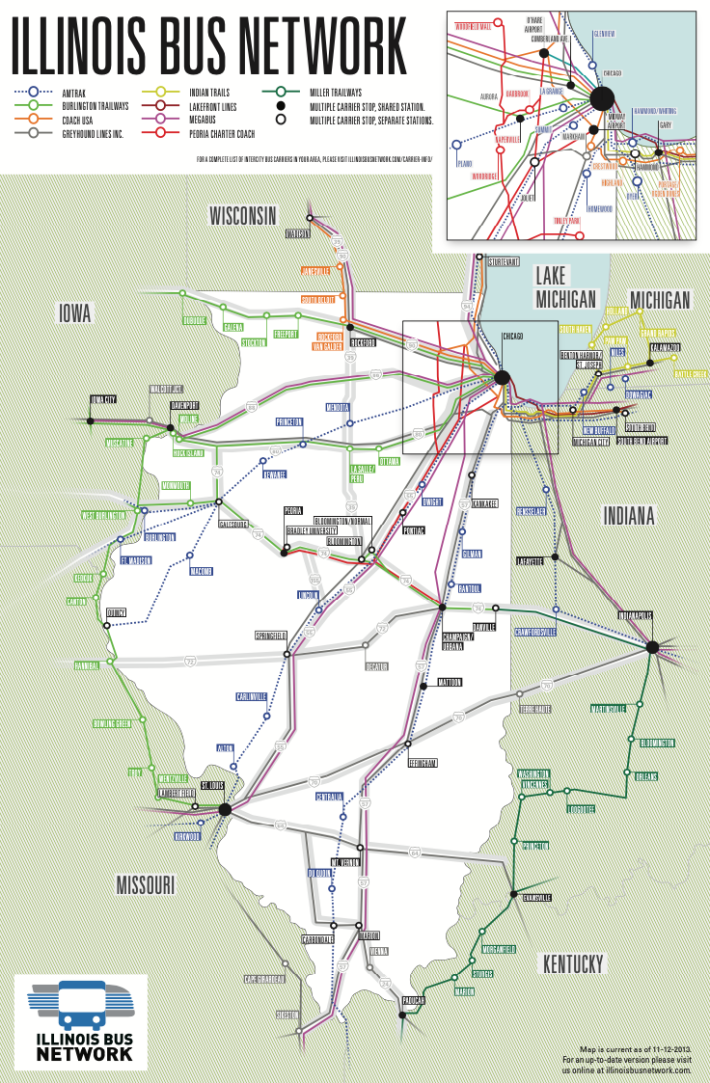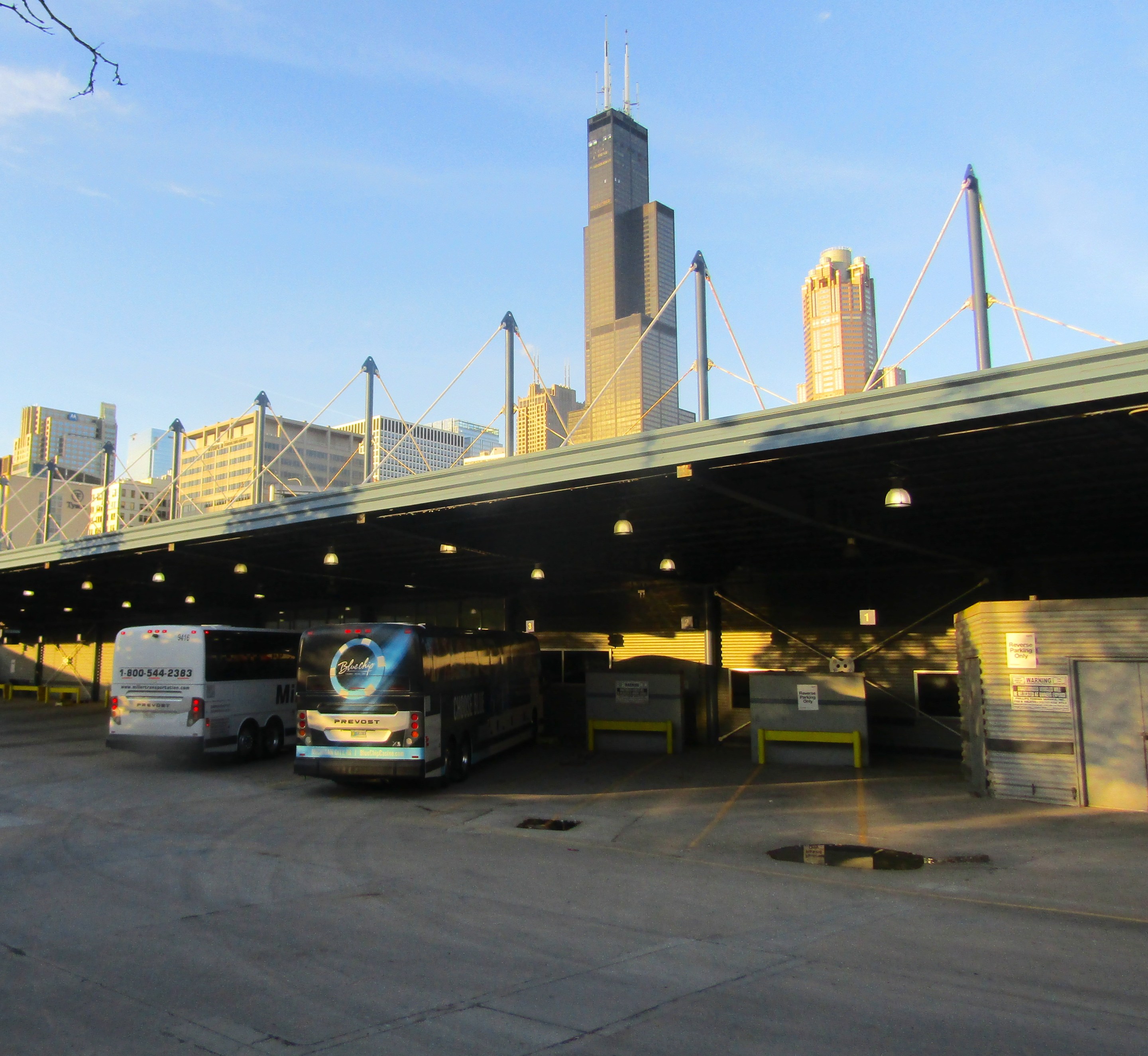Intercity bus companies like Greyhound and Coach USA occupy an interesting niche in United States transportation system. Unlike Amtrak and regional public transit systems, they are privately owned. And unlike airlines, they don’t get federal subsidies to serve smaller markets (although some do get state or county money to provide local service). They provide services to many towns, in Illinois and across the country, that don’t have any other intercity transit options.
During the COVID-19 pandemic, intercity bus ridership plunged, leading to a huge drop in revenue. Unlike airlines and public transportation providers, buc companies haven’t received any federal aid to keep them afloat. The companies serving Chicago have either severely cut service or suspended it altogether.
Things may be slowly picking up. Some companies, such as Coach USA, are gradually bringing the service back with additional safety precautions. But with others, it is not clear when the service suspensions will be reversed, or if they will be reversed at all.
The players
Greyhound is probably the most famous intercity bus company in the U.S., followed by Megabus, a Coach USA subsidiary best known for offering cheap travel between major cities and college towns that can only be booked online. But there are many other players across the country that often serve towns where the other companies don’t go and/or provide direct trips to the major airports. The Chicago area is no exception.
Burlington Trailways connects Chicago to destinations in Illinois and rest of the Midwest. Indian Trails links Chicago to a variety of destinations throughout Michigan. Coach USA’s Van Galder subsidiary runs between Midway Airport, Union Station and O'Hare, and the cities of Rockford and South Beloit in Illinois, and Janesville and Madison in Wisconsin. The company’s Wisconsin Coach Lines subsidiary links the O’Hare Airport to, as the name implies, the Wisconsin cities of Kenosha, Racine, Milwaukee and Waukesha. Peoria Charter provides connections to major downstate Illinois college towns: Bloomington-Normal, Peoria and Champaign-Urbana.
Before the coronavirus crisis, the companies often competed with each other. Rockford, for example, was served by Greyhound, Van Galder and Burlington Trailways. But there were also towns where only one company provided any kind of intercity bus service. In Illinois, Galena, Freeport and Stockton were only served by Burlington Trailways, while South Beloit was exclusively served by Van Galder.
When the pandemic struck, the responses from the bus companies varied a great deal. Van Galder and Indian Trails suspended services altogether -- in Van Galder's case, 175 employees were laid off. Megabus suspended trips for the entire Midwest region. Wisconsin Coach Lines reduced its schedule, and Peoria Charter ended all trips between Chicago, Peoria and Bloomington-Normal, while only keeping one trip each way between Chicago and Urbana-Champaign. Burlington Trailways closed many of its station buildings in Illinois and reduced hours for several stations in other states. But it continued to serve all stations until June 1, when it eliminated service to Freeport, Galena, Rockford, and Stockton.
Greyhound reduced the number of trips, and while it did suspend services to some stations, none of those stops are in Illinois.

The Financial Picture
Normally, the bus companies don’t just depend on passenger trips for revenues -- they offer sightseeing tours, private charter trips and, in some cases, ship packages. Suffice it to say, most of those revenue streams have been dramatically decreased as the pandemic caused the demand to plummet.
According to a May 20 press release from Midwest Bus & Motorcoach Association, while the $2 trillion CARES Act made $100 billion in federal grants and loans available to airlines, airports, public transit systems, and Amtrak, none of that money went to the intercity bus companies. The company stated that, under normal conditions, U.S. bus companies transport “nearly 600 million [passengers a year], which is in line with domestic airlines’ trips.” U.S. bus companies had furloughed 90 percent of their estimated 100,000 employees by that point, and they requested “$16 billion in federal grants and loan guarantees” to tide them over.
“For nearly two months Midwest buses have sat idling while motorcoach employees have remained at home,” MBMCA’s president David James in a statement. “As America begins to reopen, our economy will need us back on the road to bring people from point A to point B and serve our communities again. Without help from the federal government, buses across the Midwest may never return to the road and our passengers will be stranded without access to the nation’s transportation system.”
Bloomington Trailway' statement announcing service reductions alluded to the financial difficulties. “The COVID-19 crisis has disrupted almost every industry in the country; the scheduled route bus industry is no exception,” it stated. “As the country recovers, service availability will be re-evaluated. If you are inclined to do so, please call or write your representatives to let them know what impact the scheduled route bus service has on your community and what this loss means to you.”
The Future
This month, some of those intercity bus companies started to restore service. Van Galder revived its service to O’Hare Airport on June 15, although it’s operating at reduced frequencies and doesn’t currently go all the way to Madison. Service to Union Station and Midway Airport is still suspended. Indian Trails is tentatively planning to resume service in July, but it hasn’t settled on the exact dates.
While Megabus’ Midwestern service was originally scheduled to resume on June 17, it is currently only possible to book Chicago-Indianapolis trips. You won't be able to book other routes until at least July and, in some cases, August.
Coach USA didn’t give any specific deadline for when the suspended Megabus and Van Galder services might resume, telling Streetsblog only that they’re “optimistic that we’ll be able to resume all routes in the near future."
Bloomington Trailways and Peoria Charter didn’t respond to requests for comment by deadline.
All companies that are currently operating are requiring riders to wear face coverings on the buses. Coach USA, Greyhound and Burlington Trailways specifically mentioned that they're cleaning frequently touched surfaces regularly, and generally doing more to clean their buses and stations. Coach USA is capping the capacity for all buses at 50 percent, and implementing an “empty seat guarantee” so that, unless a passenger is traveling with a companion, the seat next to them will always be unoccupied.




